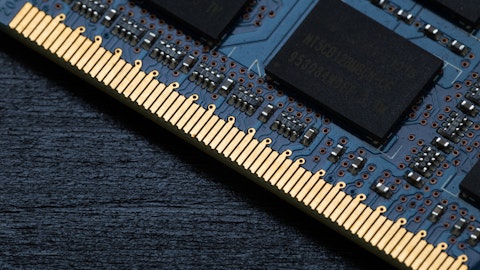But because it’s such an enabling technology, it will hold because there’s no replacement for this technology or technologies, I should say. We just need the people to wake up in the morning and start to think about working together. Fifth question, I don’t remember, but I hope I answered through my long answer to the fourth – to the others.
Ashok Kumar: Yes, you did. Again, thank you very much. And best wishes.
Yoav Stern: Thank you. Any more questions, please.
Operator: The next question comes from the line of Sol Zelman with Gericare. Please go ahead.
Sol Zelman: Good morning, Yoan. And thanks for the information shared on the call. Really great on the presentation. Great quarter results. I have two questions, one largely based on the press release shared this morning. Based on the forward-looking strategy of going the M&A strategy, I see that strategy of waiting to see what will happen has paid off, especially based on the valuations of the peers that you mentioned going down daily. The question is, based on that press release, and given those dynamics and even egos among those other 3D printing companies, would it be better placed to possibly wait and purchase them through bankruptcy proceedings, or is it a better idea to continue going through it? For example, I had seen that Stratasys deal was up in the air.
I did see in the presentation. I see them dropping daily. I even see, for example, another one, DM currently, based on their Q4 cash numbers, coupled with the stress in the bond market, DM currently is trading at $0.50 on the dollar. It looks like you won’t have long to wait. Is the strategy to go for it now or, yes, to wait a little bit just to see if they go towards the bankruptcy proceedings, allowing that strategy to fully pay off?
Yoav Stern: Okay, that’s an excellent question. And both companies that you have mentioned indeed are burning cash. Stratasys has burned about $160 million to $180 million during ‘23. They started the year with above $300 million. They have left with $160 million. And if they keep burning at the same rate, they will probably need to raise money or take debt. I don’t think they’ll aim to go to Chapter 11. Stratasys is a serious company, and I think they have good prospects for the future if they do the right thing, which they’re not doing right now. But they are smart people, and we are the main shareholder of Stratasys, so I have a very serious interest. So these are not at the risk which you describe. The others do.
Sorry, the others are at the risk, exactly what you describe. If they continue to play the game on their own, it’s like soccer. Or you want to play soccer with 11 against 11? That’s great. You want to play soccer where you’re alone in the field and running with the ball? Good luck. Because that’s what we’ll end up. You’ll end up with three or four players running on a soccer field with a ball each. And then what do you do? They do the Chapter 11 is not something I want to wait for. I’ve been myself a turnaround executive, and I’ve done Chapters 11 as a person who came from the outside to fix the situation. And I was successful in a couple of them. But it’s a very difficult process. We are dealing with the industry that, with customers like NASA and SpaceX, and we specifically have a lot of defense customers, and the other competitors have defense customers.
Those customers will have serious issues to continue and buy from a company that’s in Chapter 11. Chapter 11 is a process that takes, at best, 6 months; at worst, more than a year. And I expect that in sensitive equipment like this and sensitive industries that we’re selling to, what you gain by maybe buying what’s left is lost by what’s left is far from what is before they go to Chapter 11. One of a company in the industry called Fast Radius, went already to chapter 11, and it immediately turned into Chapter 7, which is liquidation. This company, we were the last one to do due diligence and to consider buying them. We did a very serious due diligence, and it ended up that we said, there is nothing here that’s worthwhile paying what they wanted to.
Again, ego issues. And the minute we said no, they went into Chapter 11. I was sorry for them. But from Chapter 11, some company bought their assets, like the 20 or 30 machines that they had, and the company disappeared, and everything they had and technologies disappeared. So, no, I don’t think waiting for Chapter 11, even if I have to pay 10% more, you will gain much more than having to deal with the breakage and loss of business that you will have to deal with after Chapter 11. The next question, please.
Operator: The next question comes from the line of Katherine Thompson with Edison. Please go ahead.
Katherine Thompson: Hi there. I wanted to ask a question about your revenue growth in the year just gone and also the outlook for the coming year. So just to get a sense of how much business did you get from repeat purchases from existing customers? How much was new customer wins? How much is system sales versus consumables? And really just to get a sense of how much more you think you can grow in 2024? And then just a second question on consolidation, clearly, you’ve got the bid in for Stratasys at the moment, and we’re still waiting for the outcome on their strategic review. If that’s a no, what would your plans be?
Yoav Stern: What was my – sorry, the last sentence, what will be my – our what…?
Katherine Thompson: What are your – what would your plan be if Stratasys says no, I am assuming you have got various other companies that you are considering for consolidation?





